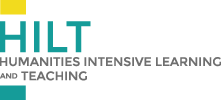Courses 2019 · IN
- Black Spatial Humanities
- Collections as Data
- Digital Humanities + Latinx Studies: Doing Work that Matters
- Getting Started with Data, Tools, and Platforms
- Help! I’m a Humanist! — Humanities Programming with Python
- Image Analysis with Deep Learning
- Introduction to the Text Encoding Initiative (TEI) for Black Digital Humanities
- Text Analysis with Machine Learning and NLP
Instructors
-
Warning: Undefined variable $page_object in /home/dhtraining/public_html/hilt/wp-content/themes/hilt-child/single-hilt_course.php on line 84
-
Brandon Walsh
Head of Student Programs, Scholars' Lab University of Virginia
-
Ethan Reed
Department of English Literature University of Virginia
Description
This course introduces participants to humanities programming through the use of Python for data acquisition, cleaning, and analysis. The course assumes no prior technical knowledge and will focus on accomplishing basic research tasks. Students should walk away feeling equipped to tackle a variety of typical problems that arise for digital humanists.
We will discuss programming and debugging concepts through the design, implementation, and presentation of small projects working with humanities data. Primary technologies and topics covered in this course will include the command line, Git, GitHub, and Python; working with data sources such as API’s, CSV files, and data scraped from the web; and basic text analysis. Over the course of the week, we will work with data from DPLA and Project Gutenberg. If the words above mean nothing to you, don’t panic—this course is for you.
If you intend to bring your own laptop, you will need to have administrative rights in order to install software. Please feel free to write us if you have concerns or questions about what that might mean – it’s easy to answer a quick email and make sure you’ll be set up for success!
Course Preparation:
You’ll need administrator access to your computer. This isn’t usually a big deal if it’s a personal laptop, but if you’re using a work laptop you might have to talk to IT to make sure that you have the ability to install things on it.
All of our course resources, exercises, and slides are at humanitiesprogramming.
Slides for the course are at github.com/
We’ll be using Python 3 in the course, but don’t worry if you don’t know what that means just yet.
You have absolutely no work to do in advance of the course. But if you feel that you prefer having a little time to do prep ahead of time so that you won’t be hanging on too tightly during the course you might check out the appendix and first 8-9 exercises available at https://
Location
1130 University Library

